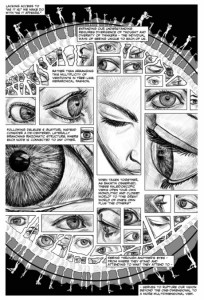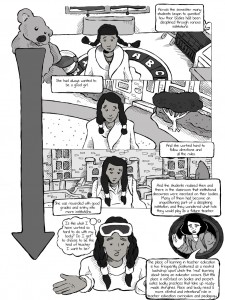Last week I was in San Francisco for the American Educational Research Association (AERA) conference. Among other things, I was presenting a paper on Comics-Based Research, the use of comic-book style art and storytelling in educational research. When I got there, I found an entire panel presentation on the topic! For the past five years I have been exploring how to use comic-book style art in my research on cultural organizing, but until last week I had never met someone else doing the same — and I came away both awed and excited by what I saw.
One member of the panel was Nick Sousanis, a doctoral student at Columbia’s Teachers College. He is currently doing his dissertation entirely in comics form. His complex black-and-white layouts are stunning, and he uses the comic form to concretize big, abstract ideas about visual/verbal knowledge and how comics work. You can see pages from his dissertation on his website: http://spinweaveandcut.blogspot.com/
Another panel member was famous activist, educator, and author Bill Ayers. He was there to speak about the process of turning his book To Teach into a graphic novel with the help of artist Ryan Alexander Tanner. He spoke eloquently about how his thinking shifted through the process — from thinking they were merely going to illustrate his writing, to understanding that they had to write an entirely new book using this unique form. You can read my review of the resulting collaboration here: To Teach: The Journey in Comics
The third panelist was James Woglom, a comic artist who has been working with researcher Stephanie Jones to translate her research on feminist pedagogy into comic form. The two have developed an intriguing collaborative system of analysis and writing, and have published in Teachers College Record and the Harvard Educational Review.
And chairing the panel was Marcus Weaver-Hightower, a professor at the University of North Dakota whose research, in comic form, explores the incredibly difficult topic of losing a child at birth, with a focus on the experience of fathers. His work has recently been featured in the new book Qualitative Research: The Essential Guide to Research and Practice.
What struck me, as I listened to these writer/artists was the wide variety of approaches they brought to the table. Some wrote and drew alone, some struggled through the difficulties of collaboration. Some spoke of their work in terms of narrative, others in terms of the arts. They came with different levels of knowledge about comics. But it meshed better than many panels I have seen because of the obvious passion for the form, and the wide possibilities in using comics in research and writing in the field of education.
As soon as I got home I was inspired to get back to drawing!






One thought on “Comics-Based Research”
Comments are closed.